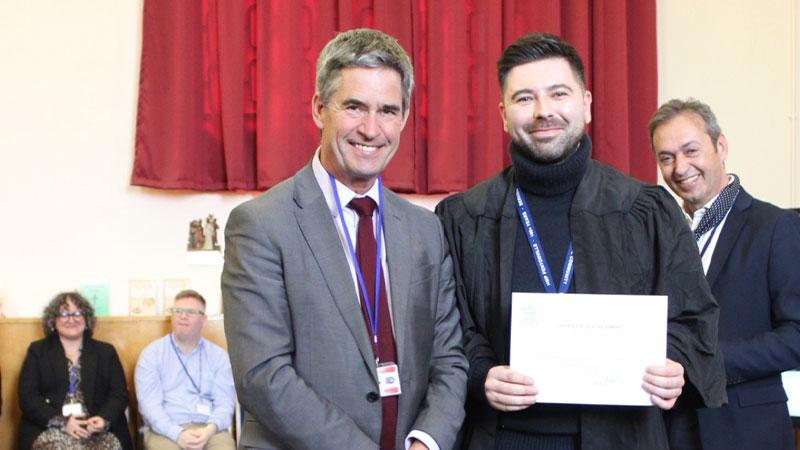The University of Westminster has held a graduation ceremony at HM Prison Pentonville in North London to celebrate the new graduates of the Leadership for Rehabilitative Culture short course.

Leadership for Rehabilitative Culture is a short course collaboration between the University of Westminster and HMP Pentonville and is funded by the Quintin Hogg Trust. Starting in January 2024, the course was taken by staff working at the prison, including prison officers, health professionals and educators, over a period of 12 weeks. The learning sessions were split between the University of Westminster Central London campus and HMP Pentonville itself.
Leadership in Rehabilitative Cultures was delivered by a team of colleagues working in the College of Liberal Arts and Sciences including Dr Thomas Moore, Dr Sacha Darke, Bryan Bonaparte, Justin Haroun, Dr Andreas Aresti and Dr David Khabaz. Also supporting the course and bringing her expertise in leadership training was Dr Randhir Auluck from the Westminster Business School.
The course was developed as part of the next phase of collaboration between Westminster and HMP Pentonville, with José Aguiar from the Prison Education team at HMP Pentonville and Dr Tom Moore, Interim Head of College of Liberal Arts and Sciences, leading the collaboration.
The short course is directly linked to Westminster’s work to deliver impact for those in the criminal justice system and is linked to criminologists working in the School of Social Sciences. It has evolved from another module taught by criminologists at Westminster, where prisoners have the chance to study a Level 3 module called Prisons and Desistance and receive 20 credits.
The Pentonville education model has been adapted and implemented in Brazil and Argentina and criminologists at Westminster are currently working with colleagues in Potsdam (FHP) to adapt and implement the model in a Berlin prison.

The development of this short course has broadened the scope of the original Pentonville model and provided a more fruitful framework, allowing all members of the prison community to engage in higher education opportunities at Westminster. Whilst the two courses are quite diverse in many ways, they share similar objectives in terms of nurturing and facilitating social change, increasing the opportunities for prisoner reintegration and mobility.
José Aguiar said: “This course brought together diverse departments at Pentonville Prison, allowing staff to learn collaboratively. By gaining insight into the various roles within our establishment, staff are better prepared to care for prisoners with dignity and humanity. The interdisciplinary approach of the course has expanded staff knowledge and skills, enabling the development of effective intervention strategies that promote an environment conducive to prisoner rehabilitation and growth.”
One of the students on the short course, Steve, said: “[T]he Leadership in Rehabilitative Cultures course was well-organised and logically structured. I believe the course has given me the knowledge, skills and attitude required to address the complexities of the prison population and to enable a rehabilitative culture in prison and hopefully lead to reducing reoffending rates.”
Dr Tom Moore added: “The short course nurtures a cultural model of rehabilitation, recognising that people serving custodial sentences need supportive cultures to undertake their rehabilitation journey. The course tackles the ‘big’ questions of prisoner rehabilitation and builds upon the culture of inclusion which we have in the College of Liberal Arts and Sciences. Working with HMP Pentonville is always enriching, we have a shared mission to drive forward inclusive and impactful social change.”
The University of Westminster and HMP Pentonville’s collaboration directly contributes to the United Nations Sustainable Development Goals (SDG): 4: Quality Education and 10: Reduced Inequalities. Since 2019, the University of Westminster has used the SDGs holistically to frame strategic decisions to help students and colleagues fulfil their potential and contribute to a more sustainable, equitable and healthier society.
Find out more about the Centre for Social Justice Research at the University of Westminster.



